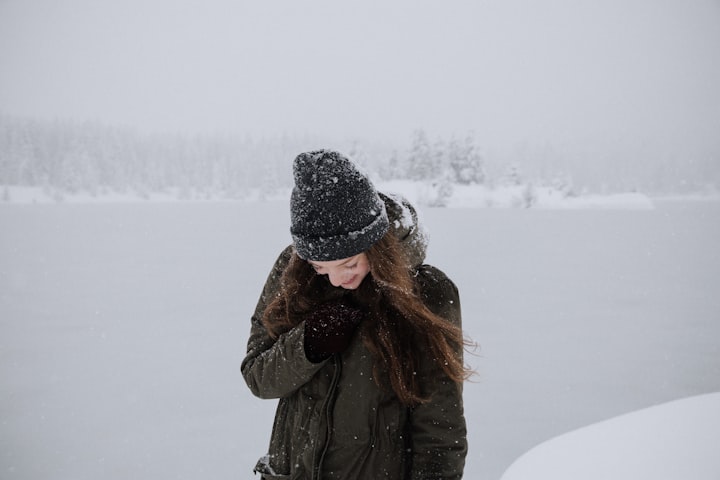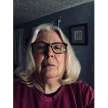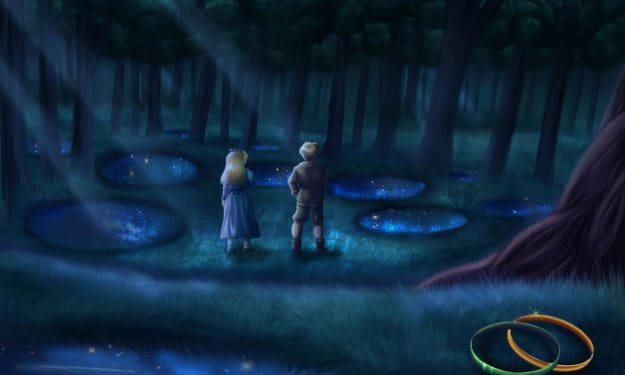
The Long Thaw
Maggie, Charlie, Nat and Max
The cattails confidently raised their velvety brown topped stalks above even the tallest grasses as the greens around the pond began to turn into the beiges and ochers of fall foliage. Even the purple loosestrife had shed its spikes of tiny flowers and delivered the seeds that would eventually choke out the cattails. Goldenrod was around, although sparse, and a few Queens Anne’s lace flower heads decorated the edges of the pond.
The boys, Max and Nat, usually ranged on ahead of Maggie, until they found something of interest, a milkweed shedding silk, a toad, an interesting stone, a small pool of minnows visible in the shallows at the edge of the pool, sandy bottom lit by sunlight. They were a little family of natural scientists with collections on windowsills and in shoe boxes under the boys’ beds, homemade wind chimes, and stones that lined the turtles’ aquarium home. Feathers became mobiles amid drawings of the birds who loved the pond as much as the boys did.
Although this was a warm, sunny fall day it would soon be the last fall day and winter would set in. Winter in northern New York came early and stayed late. It was not without sunny days, and sometimes it was almost too cold to snow, but once the snow began falling the ground was covered and frozen hard until spring.
Maggie dreaded winter these days. Her husband, Charles, Charlie, had died just before this past winter after a long bout with cancer. Maggie thought she would die too, but she lived on, or half lived. She had two small boys. Max was 3 and Nat was 5, so she had to keep up a front of normality for their sake. They were sad too and they all piled on the sofa together after the funeral was over and after the reception when the house filled with friends and family. Maggie loved her friends and family but couldn’t wait for them to stop fussing and leave. There was an insurance policy so money would not be an issue right away.
The little family slept together in the big bed upstairs and awaited spring like a pair of cubs and a mother bear sleepwalking through winter. When spring came Maggie woke herself enough to plant the vegetable garden and the boys helped. Thus began Maggie’s plan to use nature to bring them whatever pleasure they could find in it until the pain dulled.
Of course, Nat was supposed to be in kindergarten, but his birthday was on the borderline of the age chart, so she had him held back a year. He was so quick and smart that she held some guilt about it but perhaps he would be able to skip a year when they saw how intelligent he was. Nat was a sponge, and since his little brother copied each thing Nat did, Max was a mini sponge. Seeing the two dark curly heads together following a snail trail at the edge of the pond started to make pretending to feel normal less of a pretense. Pain can become background noise as daily life asserts itself. The boys pulled Maggie back from the edge of despair and their adventures made her smile.
Here was winter again though, and Maggie dreaded it. Nature was less bountiful in winter and winter distractions kept them indoors with more time to remember. Maggie feared that last year’s grief would return and that they would wallow in it. They had to put on boots and puffy coats and hats and gloves to go on the trail by the pond now, but the boys didn’t seem to mind. They made a game of breaking the fragile new ice at the edge of the pond, each of the boys rushing ahead to try to find the thin ice first. They peered through the ice to see if the minnows were still there. They weren’t. They arrived home with pink cheeks and ate the warm soups Maggie made.
Maggie started to cook again with some of the vegetables she had canned that fall. Zucchini bread was a favorite which was lucky because there were always more zucchinis than could be consumed before they went bad. Canning and baking had been grief therapies also this year. Each day you did normal things kept the grief at bay.
But empty moments once filled with a loving marriage brought sorrow roaring back. Not that Maggie and Charlie never fought but fights were more like negotiations about how their marriage would proceed, how they would raise their children. Maggie missed Charlie’s calm logic and his love of music and his steady presence. Her life was filled with the silence of a missing voice. He used to wrap his arms around her and shelter her in his love and his strength. She missed being surrounded by his presence most of all.
Maggie’s mother, Estelle, came to see how her daughter and her grandchildren were doing. She joined them all on the couch, she joined Maggie when she was cooking in the kitchen, she read stories to the boys. They watched a favorite movie over and over. It was about a whale. Estelle kept the demons at bay and gave Maggie some time to take walks in the cold, fresh air. She pestered Maggie until she made a lunch appointment with some girlfriends. It went well. No one called attention to her grief. They gossiped and laughed and had a drink or two, in some cases three.
The pond was frozen, and the ice was getting deep and safe to venture out on. The snow was only three or four inches deep but tough on little legs, so they didn’t go far. The boys loved that they were now looking at the shore from the lake instead of the other way around. The tall grasses bent in unison or whipped each other on a windy day making surprisingly gentle waves of sighs. There were footprints of small rodents and rabbits to wonder at and track. Estelle came along and soon understood that this too was therapy, and education. Before she left, she gave the boys and Maggie ice skates, and she gave them each a set of binoculars. Maggie clung to her mom a bit in the driveway, but Estelle just gave her a cheerful peck on her cheek, hugged the boys and drove away.
A neighbor with access to the pond, paid by Estelle, cleared a big patch of ice on the pond and kept it clear each time it snowed. Maggie could have kissed him, but he was a country guy and might misunderstand. At home Maggie worked her way back through her husband’s illness. He had pancreatic cancer which was relentless and guaranteed a painful end. Hospice workers came and went, with Maggie grateful for every hour they spent helping her husband through his final days. Charlie was as present as he could be until the morphine days began. Sometimes they could even cuddle carefully in their bed, where it was clear that her husband was wasting away and waiting to die. He would tell her that he did not want her to mourn him too long. He wanted her to find love again, or at least a partner, and someone to be a good father to his boys. Maggie could not, would not discuss it and insisted to Charlie that his boys would always be his boys. Maggie and Charlie’s life was measured out in increasingly larger doses of morphine. One day Charlie was gone.
Once the ice was thick and the snow was cleared the still somewhat forlorn trio set out to try skating on the ice. Maggie was a good skater and the boys, after a few tumbles caught on quickly and were soon feeling confined by the small area of cleared ice. Magically, after one extremely windy night, they arrived to find almost the entire pond clear of ice. They spread out over the ice and Maggie showed them how to skate backwards. She had a hockey puck and sticks, also left by Estelle. As soon as she slid them out on the ice, she could see that sports would be her boys next passion. Was she up for this? She found she was laughing as the boys passed the puck back and forth as they sped across the ice. Charlie, I hope you’re watching this, she thought.
It was a good winter, better than Maggie had ever imagined it would be. They got through Christmas with the help of lots of skating and hot chocolate. They got through New Year’s Eve, although Max and Nat were asleep well before midnight. Maggie too. On New Year’s Day they all heard the ice boom, but Maggie just laughed happily and told the boys it was not dangerous. She didn’t know the old pond was able to do an ice boom.
Valentine’s Day slid on by without a twinge. Maggie and Charlie had never been big on celebrating Valentine’s Day. In March they skated on, and the boys developed huge appetites and started growing stronger and taller. They had to go shopping for new clothes. In April the ice was still there but it was getting cloudy, and the edges were slushy. Ice skating on the pond was no longer safe, but Maggie and the boys were. They had made it through the worst thing imaginable and they had survived. They were still a family and the boys started planning the spring garden, ordering seeds from the catalogues at the dining room table with Maggie.
School was a tantalizing thought. Maggie thought she might enroll Max in preschool, which would soon be mandatory. He would love spending time with other children and learning new things. It was entirely possible that more than the ice might be thawing. The boys wanted a dog. Maggie thought she would say yes.






Comments
There are no comments for this story
Be the first to respond and start the conversation.